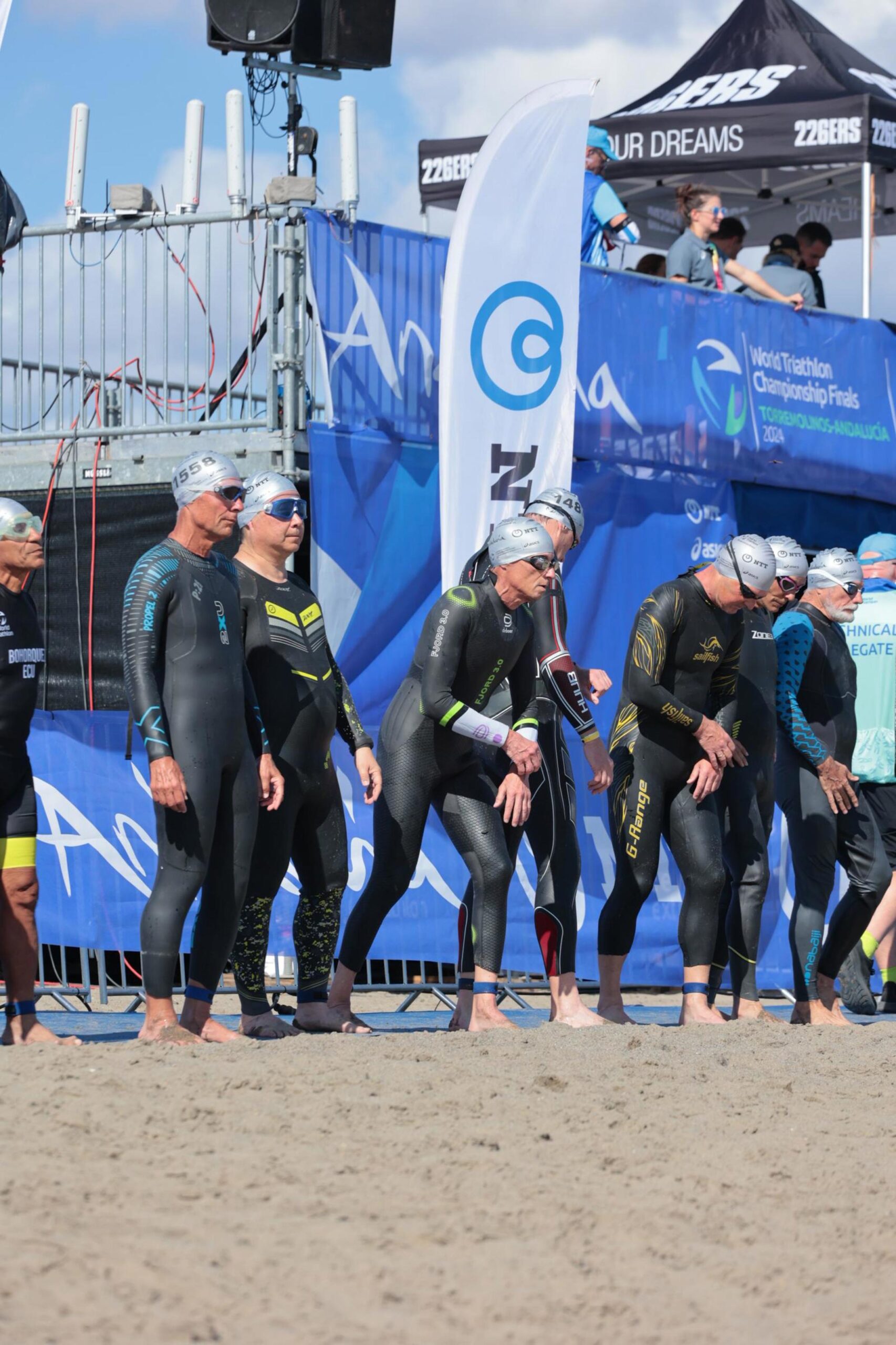Defining success in triathlon is a difficult task. When I ask most athletes and coaches how they define success, it is usually in terms of results, whether wins, rankings, or times. For others, though, success is being ![]() healthy and fit, enjoying their races, and just finishing. Though, admittedly, results are the ultimate determinant of success for most people, I have found that a preoccupation with them can both interfere with achieving those results and can produce feelings of disappointment and frustration (or worse).
healthy and fit, enjoying their races, and just finishing. Though, admittedly, results are the ultimate determinant of success for most people, I have found that a preoccupation with them can both interfere with achieving those results and can produce feelings of disappointment and frustration (or worse).
One problem is that focusing on results can actually prevent you from getting the results you want for two reasons. First, if you’re focusing on results before a race, you’re not focusing on what you need to do to get those results. Second, focusing on results, specifically, the possibility of bad results, is what causes you to get nervous before races which will only hurt your performances.
those results. Second, focusing on results, specifically, the possibility of bad results, is what causes you to get nervous before races which will only hurt your performances.
Another problem with triathlon is that your efforts don’t always lead directly to the results you want because you can’t control everything in a ![]() race. In other words, “stuff happens” in triathlon that can derail your best efforts. You can be completely ready to have a great race, but things don’t work out in your favor. For example, you experience bad weather, such as rough water or high winds. As a result, the odds of doing well in a race, if you are really prepared, are, I would say, around 80%.
race. In other words, “stuff happens” in triathlon that can derail your best efforts. You can be completely ready to have a great race, but things don’t work out in your favor. For example, you experience bad weather, such as rough water or high winds. As a result, the odds of doing well in a race, if you are really prepared, are, I would say, around 80%.
Given the uncertainty of triathlon, basing how you feel about your performance (and about yourself!) solely on your results is a recipe for experiencing the very thing you want to avoid—failure—and some pretty![]() bad feelings. I prefer to define success in terms that are controllable. To that end, here are three goals that, if you accomplish them, not only will you experience considerable satisfaction in your athletic efforts, but you are also more likely to get the results you want.
bad feelings. I prefer to define success in terms that are controllable. To that end, here are three goals that, if you accomplish them, not only will you experience considerable satisfaction in your athletic efforts, but you are also more likely to get the results you want.
“The real value of setting goals is not the recognition or reward, it’s the person we become by finding the discipline, courage, and commitment to achieve them.” Unknown
Goal #1: Before the Competition: Total Preparation
On the day of the race, all you can control is yourself, which means your ![]() preparations. When I work with athletes, I tell them that when the race starts, I want them to be able to say, “I’m totally prepared to achieve my goals today.” Ultimately, that’s all you can do.
preparations. When I work with athletes, I tell them that when the race starts, I want them to be able to say, “I’m totally prepared to achieve my goals today.” Ultimately, that’s all you can do.
Being totally prepared is the only chance you have to get the results you want. If you aren’t completely prepared, you have zero chance because you can’t fake triathlon; whatever you put into it is what you will get out of it. If you are totally prepared, you don’t, as I indicated above, have a 100% chance of success, but your chances are pretty darned good.
of it. If you are totally prepared, you don’t, as I indicated above, have a 100% chance of success, but your chances are pretty darned good.
If you aren’t totally prepared to perform your best, I have no sympathy for you because, as I just noted, you can control your preparations. If ![]() you’re not completely ready to perform your best, you have nobody to blame but yourself. On the other hand, a tough break during a race, for example, a flat tire, is worthy of some sympathy (though not too much because that’s the unpredictable nature of triathlon).
you’re not completely ready to perform your best, you have nobody to blame but yourself. On the other hand, a tough break during a race, for example, a flat tire, is worthy of some sympathy (though not too much because that’s the unpredictable nature of triathlon).
Total preparation involves looking at everything within your control that can impact your performances and taking steps to maximize all of those areas. On the day of the race, these areas include your sleep, nutrition, equipment, tactics, and warm-up. Just before the race, they include a comprehensive pre-competitive routine that is comprised of final equipment preparations and getting physically (e.g., warm-up, breathing, and reaching your ideal intensity) and mentally (e.g., imagery, focus, mindset) ready. So, when the race begins, you feel totally prepared and confident you can perform your best.
equipment, tactics, and warm-up. Just before the race, they include a comprehensive pre-competitive routine that is comprised of final equipment preparations and getting physically (e.g., warm-up, breathing, and reaching your ideal intensity) and mentally (e.g., imagery, focus, mindset) ready. So, when the race begins, you feel totally prepared and confident you can perform your best.
“Success is where preparation and opportunity meet.” Bobby Unser, 2-time Indianapolis 500 winner
Goal #2: During the Competition: Bring It!
I would argue that a “solid” effort in triathlon isn’t usually enough to get the results you want. If your outcome goals are at all high, your only chance of real success and achieving those goals is to “bring it!,” meaning pushing your limits, taking risks, and competing with abandon.
This goal seems pretty obvious given that we all know that holding back  usually doesn’t work (more on this in Goal #3 below). So, what prevents you from bringing it every time you compete? Well, an inherent danger of bringing it is that the risks you take in the process may not pay off; bringing it may lead to blowing up. In other words, bringing it may result in failure. And, for most triathletes, failure is the worst possible thing to experience and to be avoided at all cost. Yet, by not bringing it, you have no chance of achieving success.
usually doesn’t work (more on this in Goal #3 below). So, what prevents you from bringing it every time you compete? Well, an inherent danger of bringing it is that the risks you take in the process may not pay off; bringing it may lead to blowing up. In other words, bringing it may result in failure. And, for most triathletes, failure is the worst possible thing to experience and to be avoided at all cost. Yet, by not bringing it, you have no chance of achieving success.
“You didn’t wake up today to be mediocre.” Unknown
Goal #3: After the Competition: No Regrets
Have you ever been at the start of a race and just wanted a solid performance? Maybe you’ve had a string of poor races and just want to get through one without any major problems? So, you play it safe and hold yourself back. When the race is over, you’re relieved at finally having not had any major fails.
But what is the result of this sort of attitude? Usually, a pretty mediocre performance and not the result you had wanted. What’s your immediate emotional reaction? Regret. What’s regret? Wishing that you had done something differently, in other words, you wish you had gone for it (even risking blowing up) rather than having a “meh” performance. You look back at the race and wish you had charged more rather than held back.
something differently, in other words, you wish you had gone for it (even risking blowing up) rather than having a “meh” performance. You look back at the race and wish you had charged more rather than held back.
Regret is a huge value for me both in my personal life (I want to look back on my life and have as few regrets as possible) and my professional work with athletes. I want you to look back on a race, season, or career, whether success of failure, and be able to say, “I have no regrets because  I left it all out there. I may not have achieved my greatest goals. But I did everything humanly possible to be the best I could be.” You will certainly be disappointed in not fully achieving your goals, but you will get over that feeling and will likely feel great pride and inspiration in knowing that you did everything you could to accomplish your goals. Regret, by contract, can gnaw at you forever.
I left it all out there. I may not have achieved my greatest goals. But I did everything humanly possible to be the best I could be.” You will certainly be disappointed in not fully achieving your goals, but you will get over that feeling and will likely feel great pride and inspiration in knowing that you did everything you could to accomplish your goals. Regret, by contract, can gnaw at you forever.
“In the end, we will only regret the chances we didn’t take.” Unknown
You want to give yourself every opportunity to achieve your outcome goals. Yet, when you fail to achieve these three goals, you have about a zero chance that you’ll get the results you want. By contrast, I can’t guarantee success today or tomorrow, no matter what you do. But if you commit to and consistently strive toward these goals in your triathlon life, I’m willing to bet that good things will happen.







